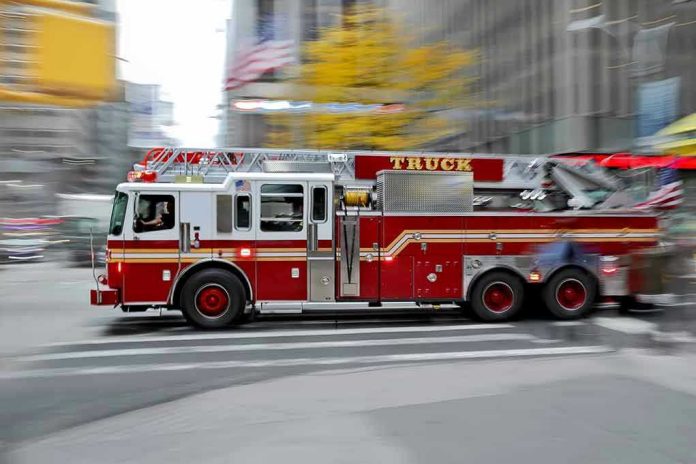
In the fiery aftermath of tragedy, one man’s quest for justice could ignite a revolution in elder care safety standards.
At a Glance
- Devastating fire at Gabriel House claims ten lives, sparking a lawsuit.
- Survivor Steven Oldrid sues for negligence in fire safety protocols.
- Impending legal battle could reshape assisted-living regulations.
- Authorities investigate potential systemic safety failures.
A Fiery Catastrophe: The Gabriel House Incident
The tranquil surroundings of Gabriel House, an assisted-living facility in Fall River, Massachusetts, were shattered in July 2025 when a fire swept through the building. The blaze resulted in the tragic loss of ten residents’ lives and has since become a focal point for discussions on fire safety in elder care environments. Eyewitnesses described the chaos as emergency responders worked to evacuate survivors and contain the fire.
Gabriel House, like many similar facilities, is expected to adhere to stringent safety standards set by state and federal regulations. However, the fire has raised questions about whether these protocols were adequately followed or if there were lapses that contributed to this tragedy. As the dust settles, legal and regulatory bodies are left to sift through the debris for answers.
The Lawsuit: Seeking Justice and Accountability
Steven Oldrid, a resident who survived the fire, has filed a lawsuit against the owners of Gabriel House. Alleging negligence, Oldrid claims that the facility failed to maintain proper fire prevention systems and did not execute an adequate emergency response during the crisis. This lawsuit is not just about personal grievances; it represents a call for accountability that could have ripple effects throughout the elder care industry.
The management of Gabriel House, now in the legal hot seat, faces the daunting task of defending their actions while protecting their reputation. This high-stakes legal battle will not only determine financial liability but could also set a precedent for how similar cases are handled in the future. The courtroom drama promises to captivate public attention as it unfolds.
Regulatory Scrutiny and the Road Ahead
In the wake of the Gabriel House fire, state and local authorities have launched comprehensive investigations into the facility’s safety measures and response protocols. The Massachusetts Department of Public Health and the Fall River Fire Department are at the forefront of these efforts, scrutinizing every aspect of the tragedy to prevent future occurrences.
The implications of this case extend beyond legal repercussions. There is a growing clamor for regulatory reforms to enhance safety standards in assisted-living facilities. As the investigation progresses, policymakers may face mounting pressure to implement changes that could redefine how elder care facilities operate, ensuring the safety and well-being of their vulnerable residents.
The Broader Impact: A Catalyst for Change
The Gabriel House fire and ensuing lawsuit have sparked a broader conversation about the responsibilities of assisted-living facilities in safeguarding their residents. This tragedy underscores the critical need for robust fire prevention systems, comprehensive staff training, and effective emergency response strategies to protect those who rely on these facilities for care and support.
As the legal proceedings advance, the outcome of this case could influence future litigation and regulatory approaches. Industry experts and legal scholars alike are closely monitoring the situation, recognizing its potential to serve as a catalyst for meaningful change in elder care safety standards. The road ahead promises to be one of legal battles, regulatory scrutiny, and, hopefully, lasting reform.
Sources:
CBS News Boston: Survivor of Fall River fire sues Gabriel House owner



